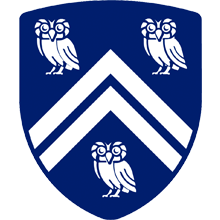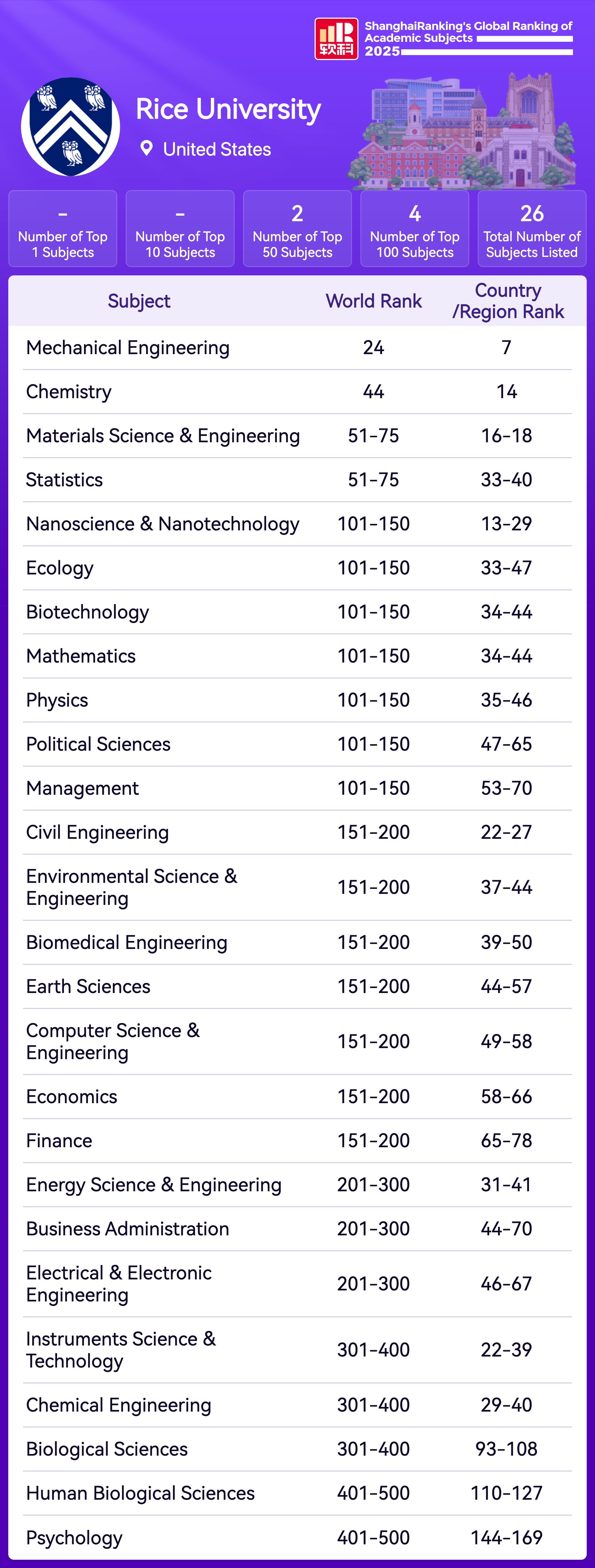 101-150
101-150 


As a leading research university with a distinctive commitment to undergraduate education, Rice University aspires to pathbreaking research, unsurpassed teaching and contributions to the betterment of our world. It seeks to fulfill this mission by cultivating a diverse community of learning and discovery that produces leaders across the spectrum of human endeavor. Education has remained at the center of Rice University’s mission since the school opened in 1912. Rice combines the advantages of a liberal arts college with the resources and facilities of a premier research university. Our students have unparalleled opportunities to learn from distinguished faculty through classroom interaction, research collaboration and experiential opportunities. Some of the important engineering and science developments include Rice becoming the first university in the nation with a department wholly dedicated to space science; Rice researchers joining Dr. Michael DeBakey and his Baylor College of Medicine team to produce the first artificial heart; and Rice professors Robert Curl, Richard Smalley and British chemist Sir Harold Kroto receiving the Nobel Prize in chemistry for their discovery of buckyballs, which introduced the field of nanotechnology. In addition to engineering, Rice has highly respected schools of architecture, business, continuing studies, humanities, music, natural sciences and social sciences. Rice also is home to the Baker Institute for Public Policy, a nonpartisan think tank that has brought a distinctive voice to national policy dialogue, and the Kinder Institute for Urban Research, an interdisciplinary research organization that now conducts the longest ongoing study, over 40 years, of any metropolitan area in the U.S. It cultivates leadership and entrepreneurship skills in its students through the Doerr Institute for New Leaders and the Liu Idea Lab for Innovation and Entrepreneurship. Students from all disciplines learn to work together to invent and problem solve in the Oshman Engineering Design Kitchen. Several initiatives, including the Center for Civic Leadership, link Rice students with opportunities for research and service in the country’s fourth-largest city. Rice welcomes students from all walks of life, many of them first generation, and supports their success with the Rice Emerging Scholars Program. Rice is consistently heralded as one of the best values in higher education. Rice practices need-blind admission of domestic students, meets 100 percent of all admitted students’ demonstrated need. Beginning in fall 2019, Rice introduced a simple, generous financial aid plan. Updated for fall 2024, students with family incomes below $75,000 receive grant aid covering their full tuition and all of their mandatory fees and room and board. Domestic students from middle-income families with typical assets receive grant aid to cover at least full tuition if they earn up to $140,000 a year, and at least half tuition for families earning between $140,001 and $200,000. Located on a 300-acre wooded campus in the heart of Houston, Rice is surrounded by the Texas Medical Center, the Museum District, Hermann Park, Rice Village and a variety of restaurants, and is a short MetroRail ride, to the theater, symphony, ballet, opera and major league sports. The distinctive residential college system enhances the Rice experience by allowing students to flourish in a community of their peers. Minority students represent more than half of the undergraduate student body, and Rice ranks highly in national student surveys for quality of life and student happiness. Rice benefits from an undergraduate student-faculty ratio of just under 6:1, a median class size of 14 and an endowment of nearly $8 billion.
 101-150
101-150 
| Subject | Rank |
|---|---|
Mechanical Engineering | 24 |
Chemistry | 44 |
Materials Science & Engineering | 51-75 |
Statistics | 51-75 |
Mathematics | 101-150 |
Physics | 101-150 |
Ecology | 101-150 |
Nanoscience & Nanotechnology | 101-150 |


| Undergraduate Programs |
|---|
Ancient Mediterranean Civilizations |
Anthropology |
Applied Physics |
Architectural Studies |
Architecture |
Architecture and Building Science |
Art |
Art History |
Asian Studies |
Astronomy |
Astrophysics |
Bassoon Performance |
Biochemistry |
Bioengineering |
Biological Physics |
Biosciences |
Business |
Cell Biology and Genetics |
Cello Performance |
Chemical Engineering |
Chemical Physics |
Chemistry |
Civil and Environmental Engineering |
Civil Engineering |
Clarinet Performance |
Classical Studies |
Cognitive Sciences |
Composition |
Computational Applied Mathematics and Operations Research |
Computational Neuroscience |
Computational Physics |
Computer Science |
Creative Writing |
Double Bass Performance |
Earth Science |
Earth, Environmental and Planetary Sciences |
Ecology and Evolutionary Biology |
Economics |
Electrical and Computer Engineering |
English |
Environmental Science |
Environnmental Engineering |
European Studies |
Finance |
Flute Performance |
French Studies |
General Physics |
German Studies |
Harp Performance |
Health Sciences |
History |
Horn Performance |
Integrative Biology |
International Concentration |
Latin American and Latinx Studies |
Linguistics |
Management |
Managerial Economics and Organizational Sciences |
Materials Science and NanoEngineering |
Mathematical Economic Analysis |
Mathematics |
Mechanical Engineering |
Medieval and Early Modern Studies |
Molecular and Cellular Neuroscience |
Music |
Music History |
Music Theory |
Neuroscience |
Oboe Performance |
Operations Research |
Organ Performance |
Percussion Performance |
Philosophy |
Physics |
Piano Performance |
Political Science |
Psychology |
Religion |
Social Policy Analysis |
Sociology |
Spanish and Portuguese |
Sport Analytics |
Sport Law |
Sport Leadership |
Sport Management |
Sports Medicine and Exercise Physiology |
Statistics |
Study of Women, Gender and Sexuality |
Trombone Performance |
Trumpet Performance |
Tuba Performance |
Viola Performance |
Violin Performance |
Vocal Performance |
| Graduate Programs |
|---|
Accounting - MAcc |
Accounting - MBA |
Accounting - PhD |
African and African American Studies - Cert |
Anthropology - MA |
Anthropology - PhD |
Applied Bioengineering - MBE |
Applied Chemical Sciences - MSACS |
Applied Physics - MS |
Applied Physics - PhD |
Architecture - MS |
Architecture and Building Science - MArch |
Art History - MA |
Art History - PhD |
Bassoon Performance - Artist's Diploma |
Bassoon Performance - MMus |
Biochemistry and Cell Biology - MS |
Biochemistry and Cell Biology - PhD |
Bioengineering - MBE |
Bioengineering - MS |
Bioengineering - PhD |
Bioscience and Health Policy - MSBHP |
Business - MA |
Business - MBA |
Business - PhD |
Cello Performance - Artist's Diploma |
Cello Performance - DMA |
Cello Performance - MMus |
Chemical Engineering - MChE |
Chemical Engineering - MS |
Chemical Engineering - PhD |
Chemistry - MA |
Chemistry - PhD |
Civil Engineering - MCEE |
Civil Engineering - MS |
Civil Engineering - PhD |
Clarinet Performance - Artist's Diploma |
Clarinet Performance - DMA |
Clarinet Performance - MMus |
Cognitive and Affective Neuroscience - PhD |
Composition - DMA |
Composition - MMus |
Computational Applied Mathematics and Operations Research - MA |
Computational Applied Mathematics and Operations Research - MCAAM |
Computational Applied Mathematics and Operations Research - PhD |
Computational Science and Engineering - MCSE |
Computer Science - MCS |
Computer Science - MS |
Computer Science - PhD |
Data Science - MDS |
Double Bass Performance - Artist's Diploma |
Double Bass Performance - DMA |
Double Bass Performance - MMus |
Dual Credit Teacher Credentialing - English - Cert |
Dual Credit Teacher Credentialing - History - Cert |
Earth, Environmental and Planetary Sciences - MS |
Earth, Environmental and Planetary Sciences - PhD |
Ecology and Evolutionary Biology - MS |
Ecology and Evolutionary Biology - PhD |
Econometrics and Quantitative Economics - PhD |
Economics - MA |
Economics - PhD |
Economics and Finance - PhD |
Education - MAT |
Electrical and Computer Engineering - MECE |
Electrical and Computer Engineering - MS |
Electrical and Computer Engineering - PhD |
Energy - MBA |
Energy Economics - MEEcon |
Energy Geoscience - MSEG |
Engineering Management and Leadership - MEML |
English - MA |
English - PhD |
Entrepreneurship - MBA |
Environmental Analysis - MSEA |
Environmental Engineering - MCEE |
Environmental Engineering - MS |
Environmental Engineering - PhD |
Finance - MBA |
Finance - PhD |
Flute Performance - Artist's Diploma |
Flute Performance - DMA |
Flute Performance - MMus |
Global Affairs - MGA |
Global Medical Innovation - MBE |
Gnosticism, Esotericism and Mysticism - Cert |
Harp Performance - Artist's Diploma |
Harp Performance - MMus |
Health Care - MBA |
Health Psychology and Behavioral Medicine Research - PhD |
History - MA |
History - PhD |
Horn Performance - Artist's Diploma |
Horn Performance - MMus |
Human-Computer Interaction and Human Factors - MHCIHF |
Human-Computer Interaction and Human Factors - PhD |
Industrial Engineering - MIE |
Industrial-Organizational Psychology - MIOP |
Industrial-Organizational Psychology - PhD |
Liberal Studies - DLS |
Liberal Studies - MLS |
Marketing - MBA |
Marketing - PhD |
Materials Science and NanoEngineering - MMSNE |
Materials Science and NanoEngineering - MS |
Materials Science and NanoEngineering - PhD |
Mathematics - MA |
Mathematics - PhD |
Mechanical Engineering - MME |
Mechanical Engineering - MS |
Mechanical Engineering - PhD |
Musicology - MMus |
Oboe Performance - Artist's Diploma |
Oboe Performance - DMA |
Oboe Performance - MMus |
Opera Performance - Artist's Diploma |
Operations Management - MBA |
Operations Management - PhD |
Orchestral Conducting - Artist's Diploma |
Orchestral Conducting - MMus |
Organ Performance - Artist's Diploma |
Organ Performance - DMA |
Organ Performance - MMus |
Organizational Behavior - PhD |
Percussion Performance - Artist's Diploma |
Percussion Performance - DMA |
Percussion Performance - MMus |
Philosophy - MA |
Philosophy - PhD |
Physics - MS |
Physics - PhD |
Piano Chamber Music and Accompanying - MMus |
Piano Performance - Artist's Diploma |
Piano Performance - DMA |
Piano Performance - MMus |
Political Science - MA |
Political Science - PhD |
Psychology - MA |
Psychology - PhD |
Psychometrics and Quantitative Psychology - PhD |
Real Estate - MBA |
Religion - MA |
Religion - PhD |
Science Teaching - MST |
Social Policy Evaluation - MSPE |
Sociology - MA |
Sociology - PhD |
Space Studies - MSSpS |
Statistics - MA |
Statistics - MStat |
Statistics - PhD |
Strategic Management - MBA |
Strategic Management - PhD |
String Quartet Performance - MMus |
Study of Women, Gender and Sexuality - Cert |
Systems, Synthetic and Physical Biology - MS |
Systems, Synthetic and Physical Biology - PhD |
Teaching and Learning - Cert |
Trombone Performance - Artist's Diploma |
Trombone Performance - MMus |
Trumpet Performance - Artist's Diploma |
Trumpet Performance - MMus |
Tuba Performance - Artist's Diploma |
Tuba Performance - MMus |
Viola Performance - Artist's Diploma |
Viola Performance - DMA |
Viola Performance - MMus |
Violin Performance - Artist's Diploma |
Violin Performance - DMA |
Violin Performance - MMus |
Vocal Performance - DMA |
Vocal Performance - MMus |